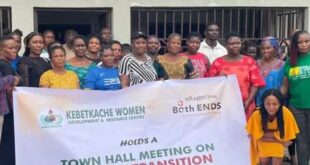… Constitute Ogoni Environmental Authority, Group tells FG
By Joel Anekwe
The Environment Rights Action/Friends of the Earth Nigeria (ERA/FoEN) has called on the Federal Government to constitute the Ogoni Environmental Restoration Authority, in line with the recommendations of the United Nations Environmental Programme (UNEP) report, so as to ensure that the remediation of Ogoni environment is effectively done.
Speaking on the topic; ‘Overcoming the gaps in Nigeria’s Environmental Reportage Presented,’ at a one-day training for journalists in Rivers State, executive director, Environmental Rights Action/Friends of the Earth Nigeria, Godwin Ojo, lamented the delay in the Ogoni cleanup process, attributing it to the lack of seriousness on the part of the Nigerian government.
Dr Ojo pointed out that the Hydrocarbon Pollution Remediation Project (HYPREP) as constituted lacks the capacity to effectively implement the United Nations Environmental Programme (UNEP) report, and urged the Federal Government to follow the recommendations of the report on Ogoniland.
He said: “Ogoni Environmental Restoration Authority should be constituted to implement the project and not HYPREP. We lack confidence in the capacity of HYPREP to carry out the process.
“HYPREP cannot do the project because they lack the machinery and they do not have the capacity to drive it. But, Ogoni working hand in hand with NOSDRA, National Oil Spill Detection Remediation Agency, UNEP and other technical partners Ogoni will be cleaned.
He added that “CSOs are planning to protest against HYPREP. Shell is responsible for the issue in Ogoni yet they are members of the governing council and board of trustee of HYPREP, so they are tele-guiding the whole process.”
Dr Ojo also noted that the Federal Government had demonstrated a lack of political will to carry out the remediation, as has been demonstrated by the shift of the date for the actual commencement of the exercise.
The ERA/FoEN executive director further called for more informed and in-depth coverage of issues on the environment in the Nigeria media.
Dr Ojo said the objective of the training for journalists in Rivers State, among other things, was to improve the frequency and quality of environmental reporting.
Stressing that environmental reporting is knowledge based, Ojo noted that knowledge gap about environmental issues is a major constraint to environmental reportage, adding that the gap transcends political, economic and cultural spheres.
Dr. Ojo said the training became necessary because there is need for journalists to be aware of the gaps in environmental reporting and strategies to overcome such challenges, adding that churches, youths and media were the major segments in nation building and that journalists should do more on environmental investigative reporting.
The journalists were later taken to a tour of some crude oil impacted sites like the Bomu oil field abandoned by Shell since 1993 and which has continued to experience spills and pollute the environment.
They also saw the Kadiro Creek, a river formerly rich with aquatic life and sustained the people but now turned into a cesspool of crude oil emitting only offensive odour and without any sort of sea food according to Erabanabari Kobah, the tour guide.
 PH Mundial – Port Harcourt Online Newspaper News Across The Region
PH Mundial – Port Harcourt Online Newspaper News Across The Region




